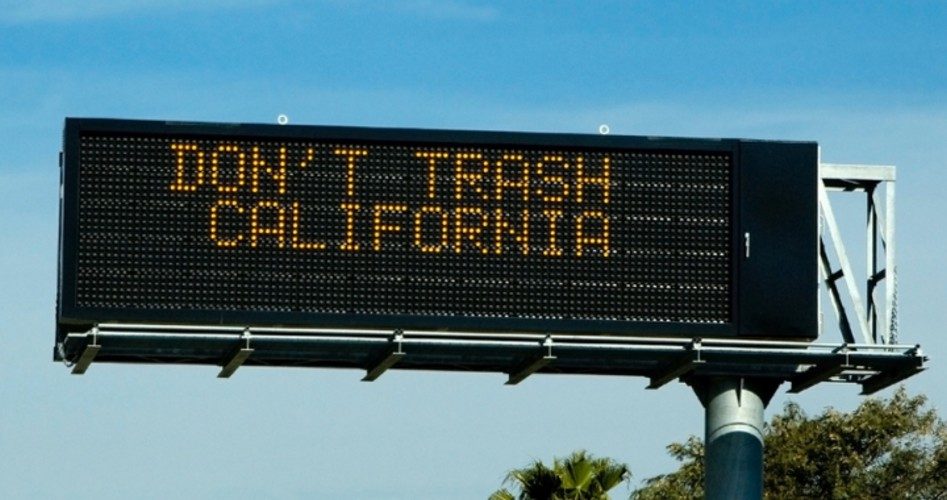
It’s a bit like a general vowing to go off to fight some ghost army on the other side of the Earth while his own land is being overrun by barbarians. San Francisco, known for aggressive vagrants and streets littered with fecal matter, hypodermic needles, and trash, is thinking globally and acting loco: Ignoring its real problems, many of its residents and politicians have resolved to banish paper to-go cups. At one café, in fact, customers will be encouraged to bring their own coffee mugs.
As Fox Business reported Tuesday, “A growing number of coffee houses in San Francisco are banishing paper to-go cups and replacing them with everything from glass jars to rental mugs and BYO cup policies.”
“What started as a small trend among neighborhood cafes to reduce waste is gaining support from some big names in the city’s food and coffee world.”
“Celebrated chef Dominique Crenn, owner of the three-star Michelin restaurant Atelier Crenn, is opening a San Francisco cafe next year that will have no to-go bags or disposable coffee cups and will use no plastic,” Fox continues.
“Customers who plan to sip and go at Boutique Crenn will be encouraged to bring their own coffee cups, says spokeswoman Kate Bittman.” (Wow, now there’s a business model that just can’t miss! Soon residents can travel with full mess kits to match the body armor they’ll need in crime-ridden leftist cities.)
Providing more examples, News Punch writes that “the Blue Bottle coffeehouse chain, which uses 15,000 to-go cups a month at its 70 U.S. locations, has stated it will ‘show our guests and the world that we can eliminate disposable cups,’ and Starbucks has plans to test recyclable cups next year in San Francisco, Seattle, New York, Vancouver and London.”
Further detail was provided by the San Francisco Chronicle last month:
While several cities in the region have banned plastic takeout containers and utensils, most haven’t tried to curb single-use compostable coffee cups. The key exception is Berkeley, where cafes and restaurants will charge customers 25 cents per disposable cup starting in January. Palo Alto has similar plans for 2021, and San Francisco Supervisor Aaron Peskin introduced legislation this year that would require businesses to charge 25 cents for disposable cups and containers.
Anticipating Berkeley’s fee, the city tapped Berkeley’s Ecology Center to start a reusable cup pilot program in September. It’s a partnership with Colorado startup Vessel, where folks can rent a stainless steel cup from a participating cafe and then drop it off at any of the 11 other participating locations.
Not only is this contrary to the fast-food imperative of convenience, but here’s a question: Has anyone calculated the resource use associated with cleaning and disinfecting these cups and weighed that against their alleged benefits?
Just as significantly, largely driving these bans is concern over plastic waste in the oceans, which, admittedly, is a problem. Yet the United States accounts for only about three percent of that waste. Almost all of it comes from just five Asian nations, with China being the worst offender.
In other words, plastic bans are symbolism over substance, and the worst offender there are straw prohibitions. Note that the paranoia about these straws — which constitute just 0.025 percent of ocean-borne plastic — was sparked by a nine-year-old’s flawed science project (really).
In reality, opposition to disposables has always been marshaled via myth. Just consider the largely forgotten event that sparked the wide-scale recycling movement: The 1987 voyage of the infamous garbage barge Mobro 4000.
Traveling around (literally) the country trying to find a place to unload its trash, the vessel became a major news story and the “poster boy” for our nation’s alleged dearth of dump space.
But it was a real load of garbage — that is, the media coverage. A reasonable business endeavor victimized by bad press, the barge’s plight was the result of an unfounded rumor that it was carrying infectious waste (video below).
As for dump space, Reader’s Digest estimated that 1,000 years of our nation’s garbage could fit in an area 50 miles square (one sq. mi. per state) piled 200 feet high, the average modern landfill’s height. The notion that America was “running out of space to put her trash” was always nonsense.
Of course, recycling is fine if it’s economically feasible and isn’t unnecessarily drawing resources from more important tasks (and possibly causing people hardship). We’ll never intelligently assess this, though, if facts are obscured by fashionable fiction.
Refusal to seek the facts also makes professed concern for the environment ring hollow. Speaking of which, consider the video below, which shows San Francisco streets littered with trash, needles, and feces.
It’s a little hard to take seriously San Francisco politicians’ claims of caring about the environment, as they bloviate about global warming and plastic in the Pacific, when their own city is a malodorous rubbish dump descending into Third Worldism. I mean, if the City by the Bay were a garbage barge, would you want it docking in your locale?
Photo: MCCAIG/iStock/Getty Images Plus


